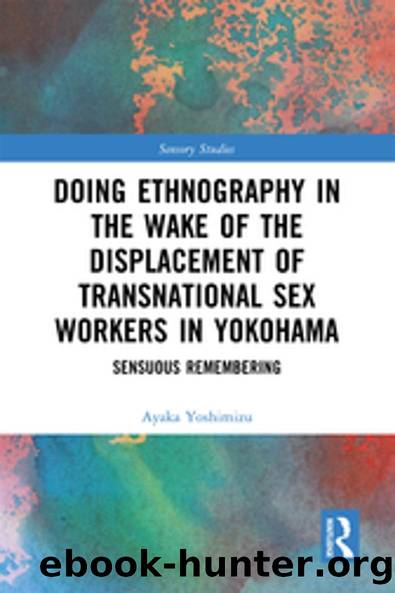Doing Ethnography in the Wake of the Displacement of Transnational Sex Workers in Yokohama by Ayaka Yoshimizu

Author:Ayaka Yoshimizu [Yoshimizu, Ayaka]
Language: eng
Format: epub
ISBN: 9781000471090
Barnesnoble:
Goodreads: 58066370
Publisher: Routledge
Published: 2021-11-22T00:00:00+00:00
Moment 2
I was walking along the Ooka River to Koganecho. I was at Khai Restaurant having dinner with Mia, but Tamura-san interrupted our meal with a phone call, telling me that Kawakami-san, one of his customers and senpai [senior] from his hometown, wanted to see Mia and asked us to come to Kikiya. Streetlights illuminated the water, and I could see pink petals falling out from the cherry trees, floating like one big carpet. Mia had grown too big to nicely fit in the carrier. I supported her neck with my arm hoping that she wouldnât wake up and start making noise. Every time I walked with her late at night, taking her to a nighttime venue, I felt like I was being a bad mother. As I approached Riverside, I looked down on the street, strode up, and went straight to Kikiya so that Mia and I werenât witnessed by people in other bars, with which I had already been familiar. I can be gossiped about. âHere you come,â says Tamura-san. âHey, washboard!â Kawakami-san teased me about my chest with his bad joke. Is he sexualizing me or desexualizing me? Either way, I didnât mind anymore. Kikiya always turned me into a young, naive girl, and I was already used to performing that role. I gave him a big laugh and squeezed myself to pass behind Kawakami-sanâs huge body to reach the end of the counter. Mia woke up. âAll right, Mia. Letâs have a walk with your âdaddy.â You remember me right?â Kawakami-san grabbed Mia with his big arms and took her outside. I was worried that she might catch peopleâs attention but was also relieved because my shoulders were light now. I could drink, talk, and behave like a normal woman at a bar. I ordered shochu on the rocks. I thought about my next phase of fieldwork. âNext time, our family will take care of Mia if it is needed,â Kohei-san, Tamura-sanâs close friend and Kikiyaâs regular customer, had said to me once. I knew that it was not a serious proposal, but I was also convinced that this was not completely an unrealistic situation to happen in Koganecho. âWe were planning a BBQ party before you leave,â Tamura-san said. Two weeks are remaining before I leave Japan. I looked at a horse race calendar on the wall. I recalled my first visit to Kikiya when I told Tamura-san and Kawakami-san my birthday. Like other birthdays, mine was marked on the calendar now.
***
Not surprisingly, as I actively participated in the everyday life of the water trade communities of Koganecho Riverside and Thai migrants, I started to be intimately involved in the lives in those communities. Developing intimate research relations had both strengths and limitations, both enabled and disabled particular acts in the field, opened up new possibilities and closed off others, and raised a particular set of ethical dilemmas. As already discussed in the âintimate ethnographic traditionâ (Irwin, 2006),4 these relationships, sexual and gendered, are important
Download
This site does not store any files on its server. We only index and link to content provided by other sites. Please contact the content providers to delete copyright contents if any and email us, we'll remove relevant links or contents immediately.
Spell It Out by David Crystal(35861)
Life for Me Ain't Been No Crystal Stair by Susan Sheehan(35550)
Cecilia; Or, Memoirs of an Heiress — Volume 1 by Fanny Burney(32095)
Cecilia; Or, Memoirs of an Heiress — Volume 3 by Fanny Burney(31484)
Cecilia; Or, Memoirs of an Heiress — Volume 2 by Fanny Burney(31436)
The Great Music City by Andrea Baker(30932)
Professional Troublemaker by Luvvie Ajayi Jones(29445)
We're Going to Need More Wine by Gabrielle Union(18664)
Twilight of the Idols With the Antichrist and Ecce Homo by Friedrich Nietzsche(18324)
The Secret History by Donna Tartt(18269)
All the Missing Girls by Megan Miranda(14861)
Cat's cradle by Kurt Vonnegut(14806)
Pimp by Iceberg Slim(13828)
Bombshells: Glamour Girls of a Lifetime by Sullivan Steve(13718)
Fifty Shades Freed by E L James(12937)
Talking to Strangers by Malcolm Gladwell(12916)
Norse Mythology by Gaiman Neil(12880)
The Social Justice Warrior Handbook by Lisa De Pasquale(11970)
Underground: A Human History of the Worlds Beneath Our Feet by Will Hunt(11857)
